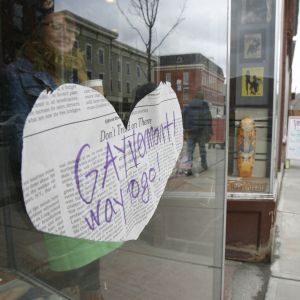 (Host) In the span of just a month, legislatures in all three states in northern New England have endorsed same-sex marriage.
(Host) In the span of just a month, legislatures in all three states in northern New England have endorsed same-sex marriage.
But legal experts say those votes never would have happened without court cases in Vermont, Massachusetts and Connecticut in which gay and lesbian couples demanded the right to marry.
Recently, justices from those courts gathered at Dartmouth College to talk about how they came to their conclusions, and VPR’s Ross Sneyd was there.
(Sneyd) Middlebury lawyer Beth Robinson has been at the center of the same-sex marriage debate for about 15 years.
Even she finds the events of the past month breathtaking.
(Robinson) "It’s a stunning shift that we’ve seen in public opinion that we’ve seen not just in the last few years but in the last few weeks."
(Sneyd) Advocates have long hoped to change the law state by state so that gay and lesbian couples could marry.
But they believed they would have to do it court by court. In 2000, the Vermont Supreme Court gave them their first victory, ruling that same-sex couples were unconstitutionally being denied the rights and benefits of marriage.
But the Vermont justices didn’t order that marriage licenses be granted. They said the Legislature had to fix the problem.
Retired Justice James Morse told the audience at Law Week events at Dartmouth that the court was well aware that it was plowing new ground.
(Morse) "We wanted a partner with the Legislature because we felt that in the long run, the whole policy debate would be furthered and the rights would be more firmly established if there were two branches of government at work here rather than one."
(Sneyd) But advocates viewed the civil unions law as “separate,” even if it was equal.
Morse says the Vermont justices didn’t appreciate the importance of the word marriage.
(Morse) "We didn’t really understand the issue of what the label meant as much then as the past 10 years, nine years or so have taught us."
(Sneyd) So when advocates went to the Massachusetts Supreme Judicial Court three years later, they highlighted the word marriage.
Justice Robert Cordy says his court was divided. Ultimately it decided to order that marriage licenses should be issued.
He dissented from that ruling because he feared the political reaction that followed.
(Cordy) "Some people have suggested a presidential election was lost because of it. We know there was a huge backlash in states."
(Sneyd) That included constitutional amendments outlawing same-sex marriage.
In Connecticut a few years later, the legislature decided to follow what Vermont had done, and created civil unions, even while a court case demanding marriage was pending.
Justice Joette Katz says that finally gave courts the opportunity to decide that civil unions was unconstitutional and it ordered same-sex marriage last year.
She says the decision turned on whether gays and lesbians had the political power to persuade a legislature to enact same-sex marriage.
(Katz) "There’s a principle in law, it’s called res ipsi, the thing speaks for itself. If you eve had to question whether a group was politically powerless, the very statute that provided all of these rights was the very statute that demonstrated that there was a very significant political powerless problem for gay and lesbians."
(Sneyd) Like Vermont, the Connecticut civil union statute defined marriage as between a man and a woman.
Not anymore. The Vermont Legislature has now adopted full marriage rights for gay and lesbian couples. Lawmakers in Maine and New Hampshire just this week did the same. And Justice Cordy from Massachusetts says that’s what he’s hoped would happen all along.
(Cordy) "The debate that’s going on now, where it’s going on now, in the Vermont Legislature, New Hampshire, Maine, New York, that’s where the debate belongs. So I’m very pleased when I see those kinds of things happening because in my view that’s where the debate needs to be won."
(Sneyd) There could still be political consequences. Opponents in Maine say they’ll try to overturn the Legislature in a statewide vote.
For VPR News, I’m Ross Sneyd.